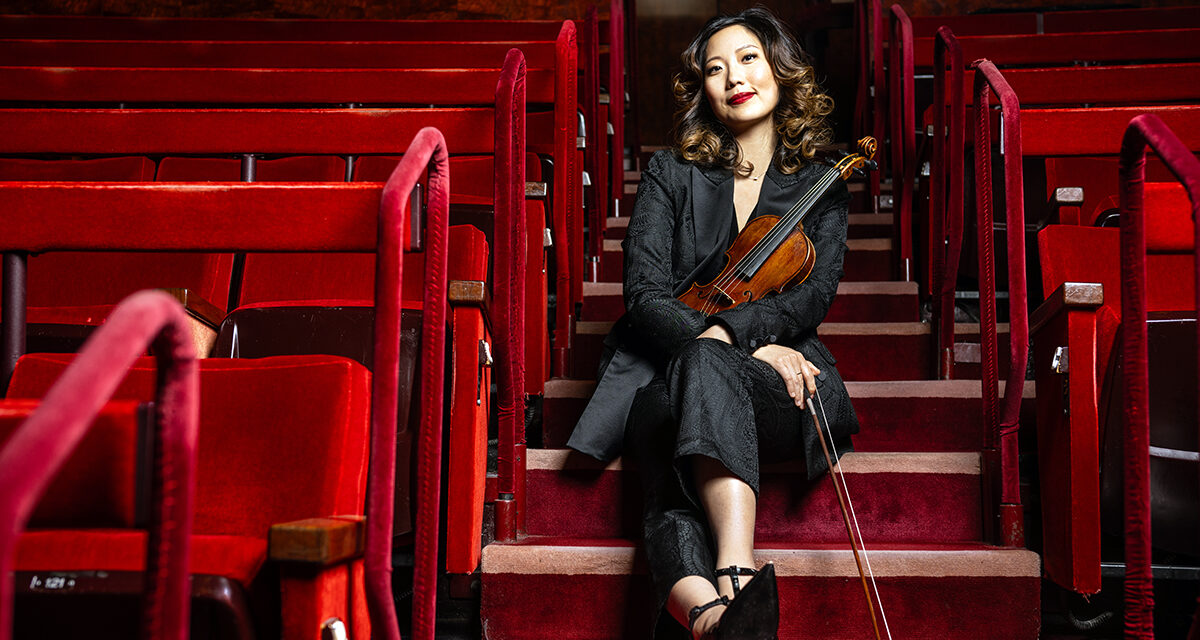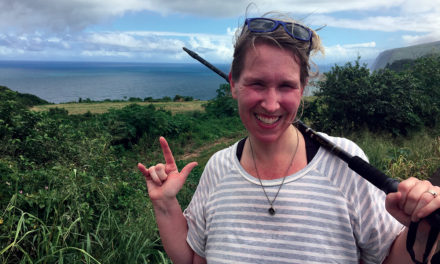Nearly three decades since she first learned to play violin, Julia Choi is a violinist for the Metropolitan Opera. In addition to musical endeavors that include solo, chamber, and orchestral appearances on three continents, Choi’s life is hitting a high note.
They had spent 18 months in the wilderness. Dreams were on hold. Savings accounts were ravaged. Lifelong plans were detoured.
Having closed on March 12, 2020, due to COVID-19, the free performance on September 4, 2021, under a tent in Lincoln Center’s Damrosch Park was the Metropolitan Opera’s first step back into the public eye. For its first concert in front of a live audience since the pandemic stopped the world, the Met played Mahler’s Symphony No. 2, also known as the “Resurrection Symphony,” a powerful, emotional, and triumphant piece.
As the music flowed through each performer, their lifeblood surging through their veins once again, their faces showed relief, pride, and, sure enough, redemption. Violinist Julia Choi, who had finally won her position at the Met Orchestra in 2019 after years of perfecting, refining, and auditioning, says that performance will be an indelible part of her throughout her life. “I vividly remember us playing that last note, and there were tears in everyone’s eyes. Even though we were outside in New York City, you could hear a pin drop. I got goosebumps,” Choi recalls. “Then the applause came much later than normal, probably because everyone was in shock mode. It made me feel very grateful that I could be part of something like that, and it reminded me that music can speak in ways that you can’t with words.”
Now, at 33, Choi’s music career is reaching a crescendo. Her résumé feels miles long, with appearances throughout North America, Europe, and Asia, and with stints as a guest musician in leading ensembles, including the New York Philharmonic, Philadelphia Orchestra, and so many more. She’s also a third-generation teacher, on faculty at Manhattan School of Music’s Pre-College Division and on the artist faculty with with the Charles Ives Music Festival in Connecticut; she’s also filled out the faculty at two new music festivals and schools: the International Summer Music School in Queens, NY, and the Vilacello Festival in Pennsylvania. She is fresh off a tour in India and Korea with the Verbier Festival Chamber Orchestra.
For Choi, the journey to get to this point started at 4 years old and involved laser focus, sacrifice, and countless hours of practice. Playing her instrument well became the focal point of her life. But she wouldn’t change it. “The violin is such a huge part of my identity,” she says. “I’ve always loved music so much. A day in life without music would be so boring.”
I want women who are in my shoes and who have been put down by a teacher or a friend or a parent to not listen to any of it. Just keep showing up.


I always felt the need to prove myself every day. I always strived to be better than I was yesterday. And a little bit better the next day. I think all my friends from college would tell you that I was the hardest-working friend that they knew.
The Overture
Making music feels almost as natural as talking for Choi. Her mom was an accomplished pianist and music teacher in South Korea before the family immigrated to the United States when Choi was 4 and her sister, Jennifer, was 2. Once they moved to North Jersey, the girls’ lives revolved mainly around music, driven by the tutelage and direction of their mom. “I have so much respect for my parents, having so much bravery and leaving home and everything they knew and that they were familiar with. They knew we would have a better future here,” Choi says softly. “Fast-forward many years later, and today my sister and I are living the immigrant American dream.”
Choi was given the violin to learn, and when Jen turned 4, she was given the cello. Although they played different instruments, the rigor of their instruction was equally intense. “My sister and I are best friends. We had a great childhood because we had each other. My parents were definitely quite strict in our upbringing. As kids, my sister and I had to make a lot of sacrifices for social events,” Choi says. “So it wasn’t always rainbows and butterflies, but in retrospect, it helped us become the hardworking, diligent women we are today.”
While their peers were playing soccer and going to birthday parties, the Choi sisters practiced their instruments 6 to 8 hours every day. Their mom quarterbacked their training, often writing copious notes on their music with critiques and suggestions for improvement. “Without that, I wouldn’t have made it.
A mother’s support is invaluable, and it really did help me every step of the way, but there are things I wish I’d had more control over from the beginning,” Choi explains.
Both sisters enrolled in the Pre-College Program (in eighth and sixth grades, respectively) at the Juilliard School in New York City, which includes a rigorous curriculum of academic classes, music theory, ear training, chamber music, and private lessons. That meant that the Choi sisters would attend regular school Monday through Friday and Juilliard on Saturdays, typically from 8 am to 6 pm. As rigorous as it was, Choi also felt a sense of relief. “I was happy to have people to relate to. My peers were doing the same things as Jen and I, so that made me feel a lot less lonely,” she says. “From the musical conversations I had with my friends, I discovered new artists, new pieces, and new repertoire that I never knew existed.”

Harmony and Tempo
Since the family moved to the United States from South Korea in the mid-1990s, learning to navigate the classical music scene to gain an edge was a challenge. That deficit left Choi with just one option to reach the pinnacle—she had to become the hardest-working musician in every school, chamber, or orchestra in which she found herself. “I remember during my freshman year, getting there and realizing how many of my peers around me knew so much more than I did. So many of them had musical parents who already knew the system and how the politics worked in music,” she says. “So I thought of myself as the underdog. I found myself feeling pretty lost in the beginning.”
But studying at Juilliard from pre-college through her bachelor’s and master’s degrees helped her find her way. Choi practiced relentlessly, and she was awarded scholarships, including the Juilliard Alumni Scholarship and the Irene Diamond Graduate Scholarship, for her studies. She also took every opportunity presented to her, and even worked as a Teaching Assistant for Ear Training at Juilliard in the College Division for 3 years. In addition to learning from some of the best music teachers in the world, Choi also gained so much from her talented peers. “It could be the smallest thing, from the way they held their violins up or the way they moved their eyebrows to how they controlled their vibrato—these are the kinds of things you can’t always learn by studying in lessons alone.”
Although Choi is grateful for the opportunities she had to learn from some of the most talented musicians and instructors at Juilliard, there were plenty of experiences that incited her underlying fears about herself in which teachers used shame as a motivator. “One time, I was told by a teacher that I had a long way to go, and she thought it was pathetic of me to go to an audition sounding the way I did at that moment,” Choi recalls. “Now, as a teacher myself, I want young women who are in my shoes who have been put down by a teacher or friend or parent to just not listen to any of it. Or take it and use it as fuel to go even further and listen to yourself, and keep going because you must overcome your fears and work through a lot of insecurity. Just keep believing in yourself and show up.”
On a High Note
Sure enough, Choi ignored any negative voices (including her own) telling her she wasn’t good enough. In retrospect, she knows that those formative experiences—even the painful ones—helped prepare her for the intense competition and the arduous audition process she’d face as she worked to win roles with elite organizations as a professional musician.
At first, the audition process was so grueling that Choi began questioning whether she was cut out to be an orchestral player. After getting her master’s degree from Juilliard in 2015 and while attending Manhattan School of Music’s Orchestral Performance Program, she spent 4 years on the audition circuit. “It wasn’t fun to go from one audition to the next. It was lonely,” Choi says. “And I was flying to auditions all over the country for a while. Flights, hotels, Ubers, repeat—it took a toll. In a lot of ways, the closer I got to winning them, the harder it got.”
But eventually, the wins began to pile up. She performed with leading ensembles, these opportunities presenting themselves due to some success in auditions, including New York Philharmonic, Philadelphia Orchestra, Minnesota Orchestra, San Diego Symphony Orchestra, Atlanta Symphony, and more. And then came the big one—the one that changed everything. “Looking back, it was years of trial and error, but I kept showing up, and eventually I won my dream job,” Choi says. “I still have this Instagram post from about 15 years ago, when my sister and I were standing in front of the fountain at Lincoln Center during our days in college. The caption literally says, ‘One day…#bigdreams.’” Choi joined the first violin section of the Metropolitan Opera in 2019, the role she’d dedicated her entire life to landing.
Jen, meanwhile, joined the Dallas Symphony Orchestra in September 2019. In cities 1,500 miles apart, the sisters were each living out their dream, one that came to a screeching halt when the pandemic shut down the world just a few months later. “The Met Opera closed on March 12. At that time, they said that we’d be back after 2 weeks. And then they closed for the next 2 weeks, and it kept getting longer and longer.”
After spending a stint back with her parents in New Jersey, Choi headed to Dallas to ride out the pandemic with her sister. “I used that time to try to figure out what really means the most to me,” she says. “I did all the things that I had put off for a really long time, like reading books, picking up languages, learning to cook, and practicing solo pieces.”
Outside of her family, what means the most to her, it turns out, is music. She still loves to play—you can see it in the reverent way she holds her instrument. “What do I love to play? The Mozart, Puccini, Strauss, and Verdi operas… Mahler 2, Mahler 3—all the Mahlers, really. And of course the traditional symphonic repertoire like Tchaikovsky, Beethoven,” she says. “There’s just too many to name.”
But Choi also feels incredibly attached to teaching music—something about introducing people to the form of expression she most loves can be a nearly spiritual experience. “Even now, when I teach chamber music to younger students who have never played chamber music in their lives, it’s the most special thing because they’re learning for the first time ever to communicate without talking to each other and through music,” she says. “My students really do give me purpose.”
One of the downsides of constantly working at a craft to improve and be at the top of the world is a never-ending need for improvement. But Choi is working on that part of herself, too. “I want to get off the hedonic treadmill of always trying to prove myself and just being happy about where I am now and being grateful for all the things that I have and what I have accomplished. Or at least that’s the goal.”






